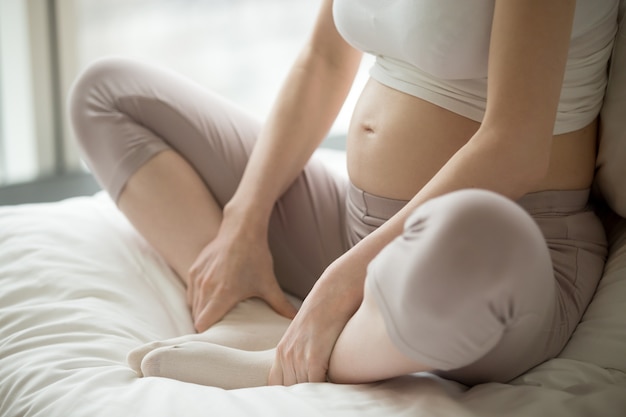
During pregnancy, women often experience physical pressure and discomfort due to significant changes in their bodies. One of the most common issues is leg cramps, especially during the second and third trimesters. These cramps occur as the growing baby, expanding uterus, and additional weight put pressure on the legs and calf muscles. Although the discomfort usually disappears after delivery, there are natural ways to manage the cramps during pregnancy.
### Causes of Leg Cramps During Pregnancy
#### Uterus Expansion
As the uterus grows to accommodate the developing baby, it exerts pressure on the nerves in the legs and calves, often leading to cramps or muscle pain.
#### Weight Gain
During pregnancy, weight gain is natural and typically ranges from 8 to 10 kilograms. This extra weight puts added stress on the legs and calves, with cramps often worsening at night.
#### Vein Stretching
An enlarging uterus also stretches the veins in the legs, disrupting blood flow and causing cramps. Additionally, blood volume increases by about 20% during pregnancy to support the baby, contributing further to the strain on leg veins.
#### Altered Blood Circulation
The expansion of the uterus can obstruct blood flow from the legs to the heart, affecting circulation and potentially causing leg pain. This issue is not unique to pregnant women but can be more severe during pregnancy.
#### Fatigue
Carrying extra weight often leads to fatigue, which can impact blood circulation to the legs and heighten the risk of cramps.
#### Dehydration
Pregnant women need more water than usual to support their own body and the baby. If hydration levels are not maintained, leg cramps can occur.
#### Mineral Deficiency
Low levels of magnesium or calcium during pregnancy can cause muscle cramps, as the growing baby absorbs nutrients from the mother’s diet. This can be worsened by certain medications or an imbalanced diet lacking these essential minerals.
#### Hormonal Changes
An increase in progesterone levels during pregnancy can affect muscles, including those in the legs, often causing cramps to become more severe, particularly at night.
### Tips to Alleviate Leg Cramps During Pregnancy
#### Eat a Balanced Diet
Maintain a well-rounded diet rich in essential nutrients like calcium, magnesium, and potassium. Include foods such as green vegetables, fruits, nuts, fish, eggs, and dairy products. For preventing deficiencies, consider adding iron-rich foods like liver or spinach and potassium-rich options like bananas, oranges, and yogurt.
#### Exercise Regularly
Light, leg-focused exercises or stretches can improve blood flow and reduce cramps. Activities like yoga, aerobic exercises, and walking are helpful. Stretching your legs before bedtime can also alleviate nighttime cramps. Always consult your doctor before starting an exercise routine.
#### Apply Warmth
Using a warm water bottle or heating pad on the affected area can help relieve pain. Wrap the heat source in a thin towel and apply it for a few minutes. Be cautious not to use high temperatures or leave the pad on for more than 20 minutes at a time.
#### Wear Support Stockings
Compression stockings can provide support, reduce swelling, and ease leg discomfort. These are especially helpful for minimizing pain in the calves and ankles.
#### Avoid Alcohol and Caffeine
Cut back on caffeine, as it can lead to dehydration, and avoid alcohol altogether during pregnancy for both your and your baby’s health.
#### Massage the Legs
Gentle leg massages can relax the muscles, improve blood circulation, and relieve cramps. Applying an ice pack to swollen areas or standing on a cool surface during a sudden cramp may also help.
#### Rest Your Legs
Make time to rest throughout the day and avoid long periods of standing. When sitting, avoid crossing your legs, as it can restrict circulation and cause swelling. Short breaks to elevate your legs can also help.
#### Stay Hydrated
Drink 11 to 12 glasses of water daily to ensure your muscles remain hydrated. Other fluids, such as juice, milk, or herbal teas, can also contribute to hydration.
#### Wear Comfortable Clothing and Shoes
Choose loose-fitting clothing and opt for footwear that is comfortable and has moderate heels. Avoid tight shoes, high heels, or restrictive clothing that can worsen circulation and lead to cramps.
#### Don’t Delay Urination
When you feel the urge to use the restroom, don’t delay. Holding urine can lead to muscle stiffness and leg pain. Frequent urination during pregnancy is normal and should not be ignored.
### Final Thoughts
While leg cramps are a common pregnancy symptom, they usually resolve after delivery once the additional weight and pressure on the body subside. By following these natural tips and maintaining a healthy lifestyle, you can significantly reduce the severity and frequency of leg cramps, ensuring a more comfortable pregnancy.